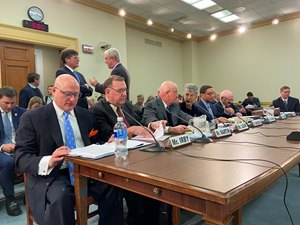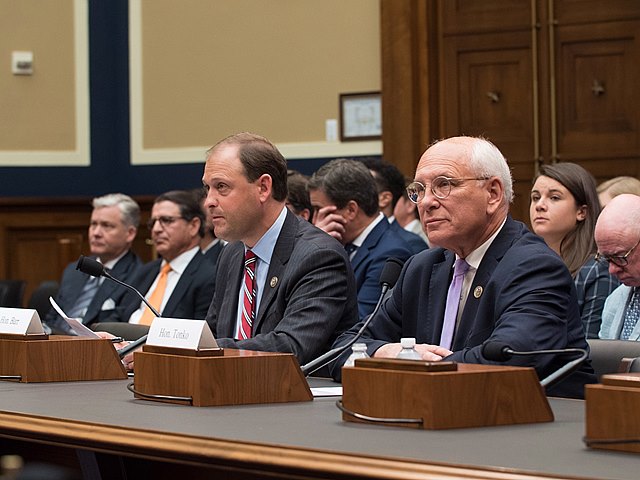Congressional Subcommittee Considers Racing Legislation


Not that it doesn't have a long way to go, but legislation that would overhaul how medication rules and drug testing are handled in horse racing took a big step forward Jan. 28 with a subcommittee hearing in a crowded room in the Rayburn House Office Building in Washington.
Reps. Paul Tonko, a New York Democrat, and Andy Barr, a Kentucky Republican, each noted the milestone of Tuesday morning's hearing and predicted further progress for the bipartisan legislation, the Horseracing Integrity Act of 2019 (H.R. 1754), they introduced in March 2019 that would see the United States Anti-Doping Agency form an authority that would include representation from major industry constituencies to regulate medication rules, policies, testing, and sanctions.
As part of that oversight, the bill calls for the elimination of any race-day medication, a policy that would end the use of race-day Lasix in the sport.
The two-hour and 15-minute hearing was conducted before the Subcommittee on Consumer Protection and Commerce chaired by Rep. Janice Schakowsky, an Illinois Democrat. The subcommittee is part of the Committee on Energy and Commerce chaired by Frank Pallone Jr., a New Jersey Democrat.
"We're very grateful to Congresswoman Schakowsky as chair of the subcommittee for hosting a hearing, which I think is very valuable to moving us forward," Rep. Tonko said. "It was a validation moment because people came to the table—and across the board—said, 'We need uniformity.' ... This was a culmination of a lot of hard work over a long period of time. Talk has been going on for decades, the time is now for action."
Rep. Barr acknowledged previous efforts for similar legislation in previous sessions of Congress fell short but he said Tuesday's hearing felt different than those past efforts. With a majority of the House now supporting the bill as co-sponsors, he's predicting further progress.
"Clearly we have a lot of momentum," Barr said. "You could see how engaged members on both sides of the aisle were. This is heading for a markup, which means it's heading to the House Floor for a vote. Whether there are amendments added to reach consensus? That's been my goal from the start—to drive this sport to a consensus—and we're making progress toward that end."
The bill, which has the support of BloodHorse co-owners The Jockey Club and Thoroughbred Owners and Breeders Association, has not been supported by either major horsemen's group—the National Horsemen's Benevolent and Protective Association and the Thoroughbred Horsemen's Association. But, it has found traction beyond the industry through placing an emphasis on equine safety. The safety issue certainly resonated as a number of subcommittee members noted their concern about the rash of equine fatalities in 2019 at Santa Anita Park.

Tuesday's hearing saw seven witnesses with The Jockey Club vice chairman and Keeneland trustee William Lear Jr., retired racing Hall of Fame jockey Chris McCarron, Joe De Francis, chairman of the National Horseracing Advisory Council of the Humane Society of the United States, and Marty Irby, executive director of Animal Wellness Action, speaking in support of the bill, while equine veterinarian Kathleen Anderson, Association of Racing Commissioners International president Ed Martin, and Dennis Drazin, chairman and CEO of Darby Development—operator of Monmouth Park, opposed it.
Lear said the Jockey Club has supported industry efforts like the National Uniform Medication Program to bring about uniformity, as well as regulatory efforts, like a state compact, but those efforts have failed to fully take root. He said the federal legislation is now viewed as the best option for bringing uniformity to the sport's medication rules, drug testing, lab standards, thoroughness of post-race tests, out-of-competition testing, and the handling of any sanctions.
"Passage of the Horseracing Integrity Act would address all of these deficiencies by combining the world's best anti-doping expertise with deep expertise and experience from within our industry, both on the governing board and in advisory committees," Lear said. "In a private—I want to underline that—a private, nonprofit entity under the umbrella of the Federal Trade Commission. The FTC has among its jurisdictional mandates, free, open, and fair competition and consumer protection, which is a perfect fit for what we're trying to accomplish. The legislation also has a mandate to provide due process guarantees to everybody."
Martin heads ARCI, an umbrella group of racing's state regulators that promulgates model rules it encourages its members to adopt. He suggested that the legislation wouldn't be needed if Congress would just require each state to adopt the ARCI model rules and any changes by reference.
Currently some states immediately adopt such rules—by reference—but others have processes that take varying amounts of time to put in place. During that process, rules can stray from the model rules or not even be adopted.
Martin suggested that states are in a better position to protect horses than a new agency created by USADA.
"The collective anti-doping drug testing program of the U.S. state racing commissions represents the largest anti-doping program in professional sport," Martin said. "In 2018, U.S. state racing commissions tested 266,300 biological samples taken from equine athletes. By comparison, the entire network of three World Anti-Doping Agency testing agencies sent 344,218 samples from their athletes to the various testing labs around the globe. By contrast, the U.S. Anti-Doping Agency sent 12,262 samples to their labs in 2018. Adding the horse racing testing to its current portfolio, as is being proposed, would increase its testing operation by more than 26 times."
De Francis, who previously served as CEO and majority shareholder of Maryland Jockey Club, said the public has lost faith in the current system to address safety issues within the sport.
"If the general public loses confidence that the people responsible for the health and safety of these equine athletes are mistreating them—as survey after survey unequivocally proves is happening to an increasing extent—then the 'invisible hand' of the marketplace will drive horse racing into extinction as surely as it has Ringling Brothers Circus," De Francis said.
Drazin and Anderson both said the legislation would not fully address the many issues that impact equine safety. Drazin said if given six months, the industry could come up with a bill that would address all of the issues involved, including track surface standards, making full veterinary records available to regulatory vets, and consistent pre-race exams from state to state.
"In other words, putting aside the fact that I have always been opposed to federal legislation and feel that the industry should self-regulate, I have been participating in an industry effort to unify and support a bill that all interested parties feel would be a compromise as an all comprehensive piece of legislation that is intended for horse racing in order to protect the health, safety, and welfare of its participants," Drazin said. "While I still believe that federal legislation is unnecessary, if it is inevitable, I want to be part of the solution and H.R. 1754 is not a solution, but only a small part of all the needed reforms for our industry."
Rep. Barr noted that Drazin is from the same district as committee chairman Pallone's district and some work may need to be done at the committee level to satisfy some of those concerns.
"He may want to offer amendments, we'll see," Barr said. "I'll encourage the chairman and all of the members of this committee to move this bill to a markup."
Tonko and Barr each acknowledged that some of the ideas of adding more measures to the bill are good ideas but they don't want those efforts to slow the progress of the legislation. They said the legislation is a way to provide the industry a tool for making its goals for integrity and safety a reality and that amendments can be added, but they're not interested in waiting for a new bill proposal from the industry.
"We're going forward; there's no time to waste here," Tonko said. "It's a major sport with a deeply rooted history. It provides great opportunity for fans, economic activity, and a great arena for people to have careers. So let's do it the right way. This is the industry asking for self-governance working with a group (USADA) that has a reputation of providing integrity and safety for human athletes."
Barr agreed the time is right to move forward.
"There may be merit to the suggestions made by those who oppose the bill; in fact I agree with many of their comments, especially with respect to veterinary records, track maintenance standards," Barr said. "All of those suggestions are good but none of them diminish the merits of our underlying legislation on the needs for medication uniformity. None of those suggestions undermine our bill. I don't expect them to slow our progress."
Drazin, who spearheaded New Jersey's legal efforts that would see the Supreme Court overturn a law that prevented states from adding sports gambling, believes the legislation is unconstitutional by commandeering states' rights. Lear said he's confident the legislation will meet Constitutional standards and hold up to any court scrutiny.
Lear also noted the bill would provide added separation between regulator and participant. He cited the California Horse Racing Board's handling of a failed post-race drug test by Justify after his victory in the 2018 Santa Anita Derby (G1) where the board opted, behind closed doors, to take no action on the test finding. CHRB equine medical director Rick Arthur said he recommended that action after determining the test was triggered by environmental contamination. But members of the board also had conflicts of interest as participants, on varying levels, in the sport.
"The legislation is founded upon the unremarkable proposition that the regulatory authority should be controlled by independent persons with deep knowledge of the subject matter, both anti-doping and horse racing, but with no conflicts of interest and nothing to gain or lose personally as a result of the regulations adopted," Lear said.
The bill's Lasix prohibition drew the usual positions on that long-time debated issue, with Anderson noting that it's the best way to treat and prevent exercise-induced pulmonary hemorrhage and that there is no scientific evidence tying the diuretic to breakdowns or enhanced performance. Rep. Earl "Buddy" Carter, a Georgia Republican, said common sense would tell him that the weight loss side effect of Lasix would help horses run faster. Rep. Carter's opinion was backed up by McCarron.
Anderson also noted that efforts in European countries to control EIPH without the use of race-day Lasix are not always effective as horses falling in this category are sometimes sent to the U.S. to race.
Barr, who represents Central Kentucky, maintained that ceasing the use of race-day Lasix would improve safety on the track but he also emphasized that it would improve safety by improving the breed.
Tonko, whose district includes Saratoga Race Course, said he was encouraged that even opponents of the legislation agreed on the bill's goal of uniformity. He said sports fans have many options and horse racing has to put safety of the horse and rider first to attract their support.
"One thing that came through loud and clear is that across the board all of the witnesses agreed to uniformity. I think that's a big move forward. With its economic impact, this is a vital industry to the country. ... It's a dangerous sport if it's not conducted with the highest standards. To have Chris McCarron, a Hall of Fame jockey, at the table speaking in support of this legislation is important."
